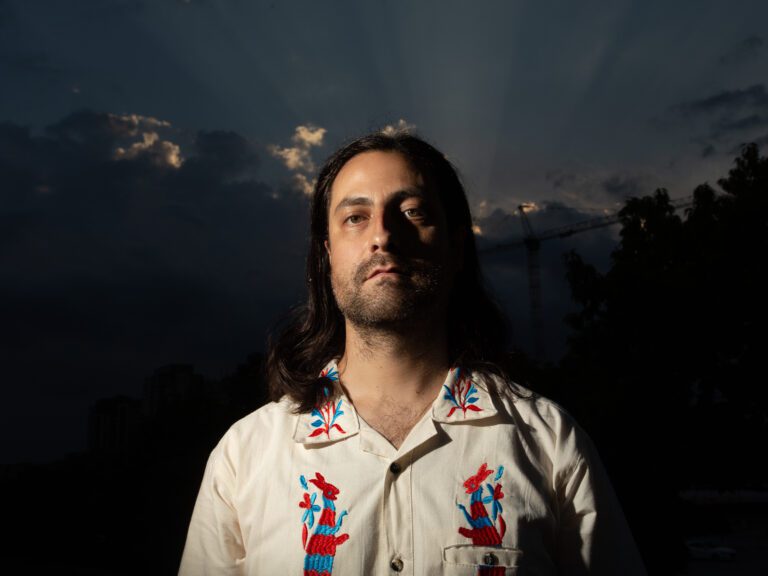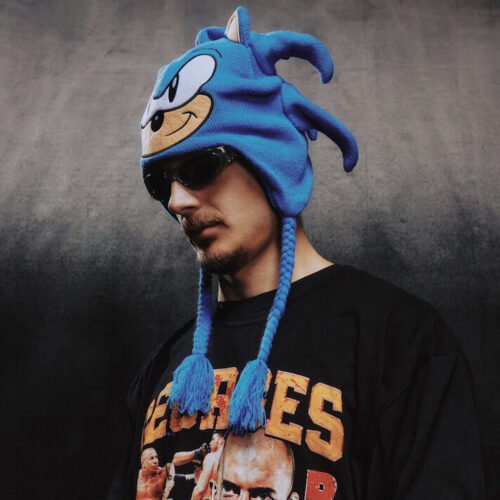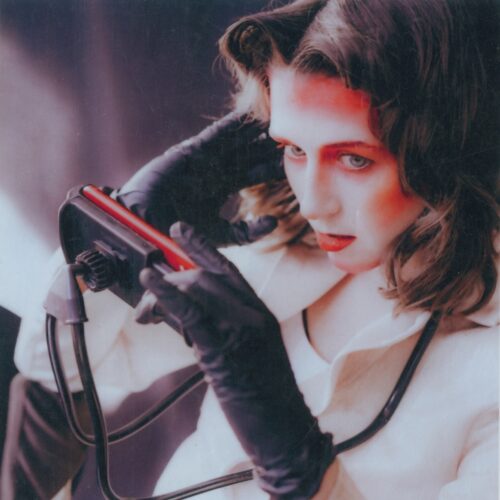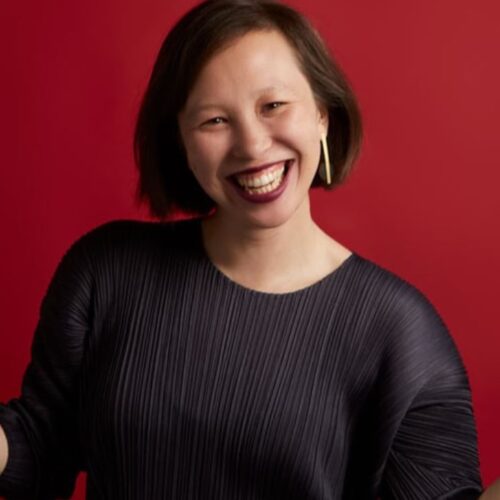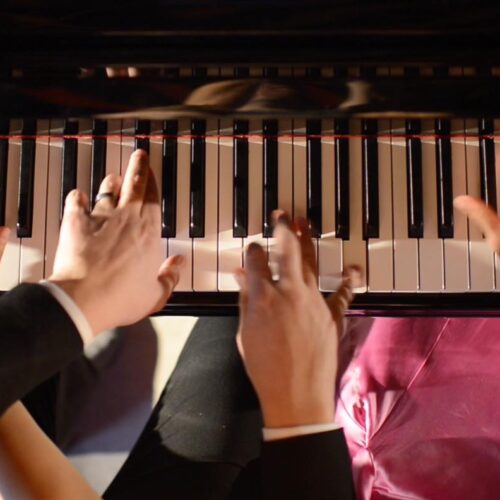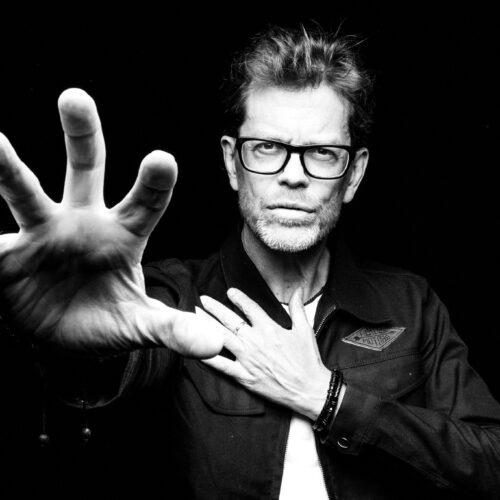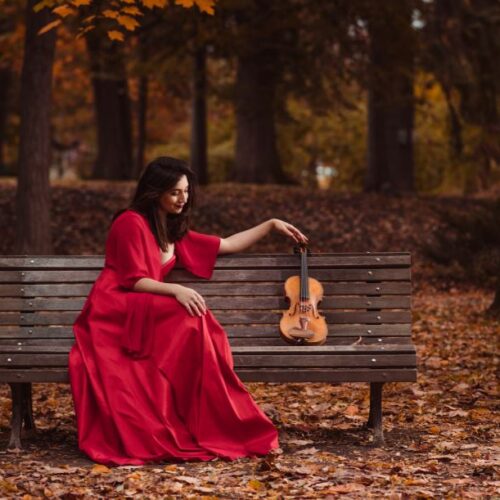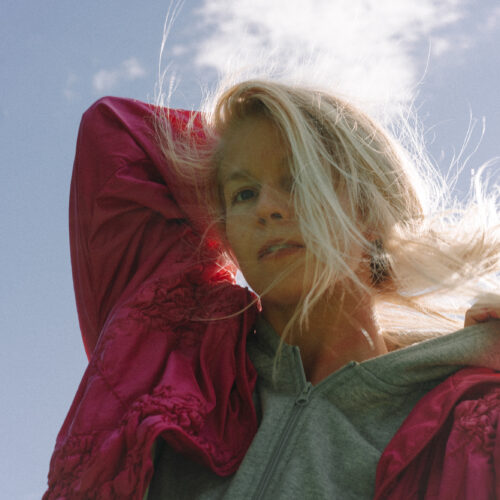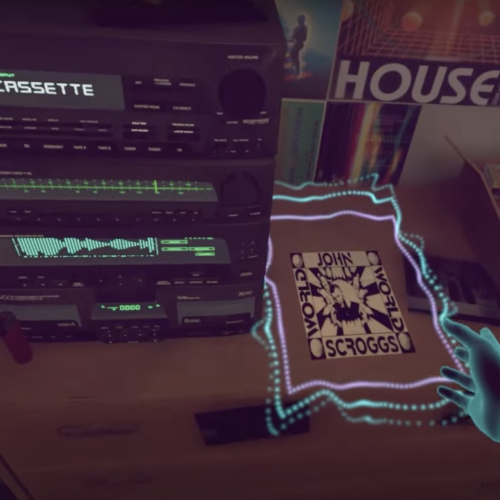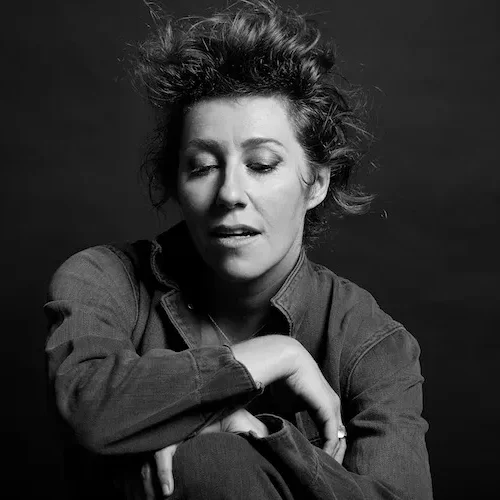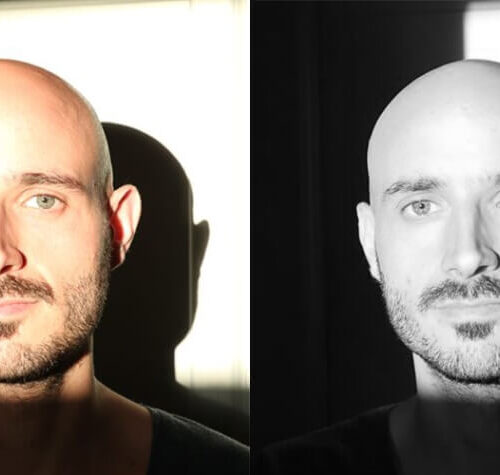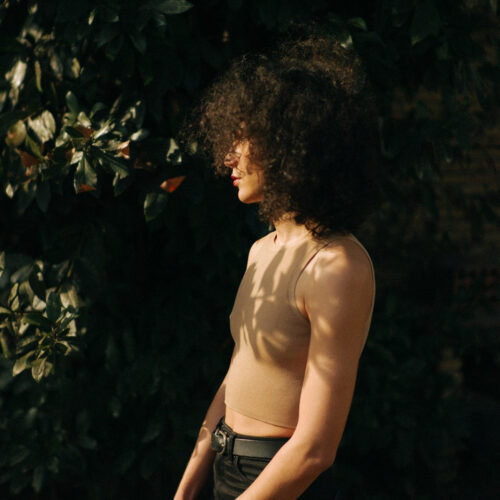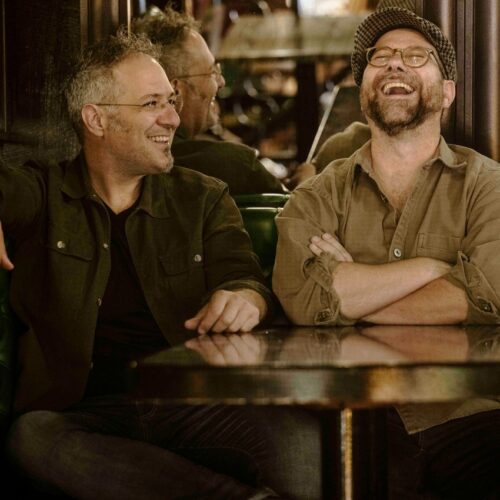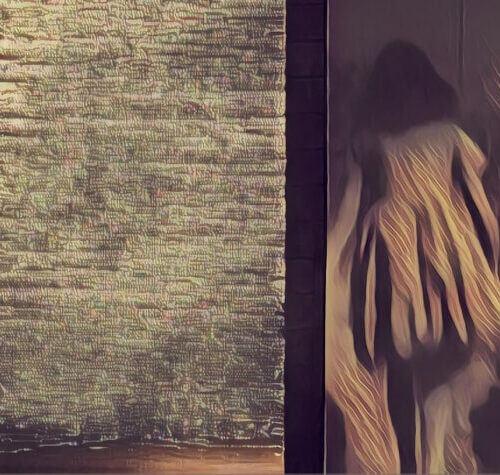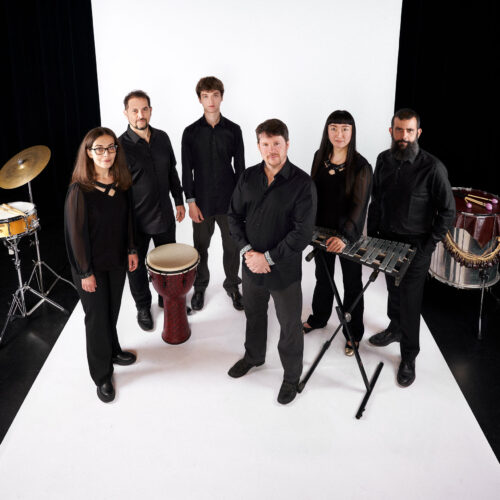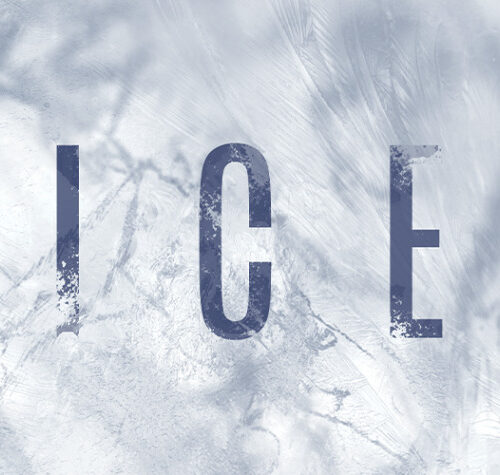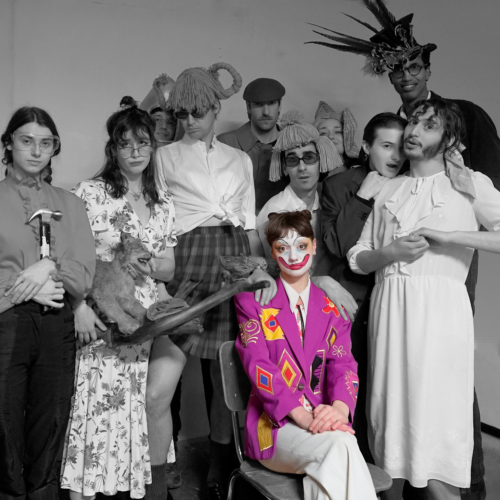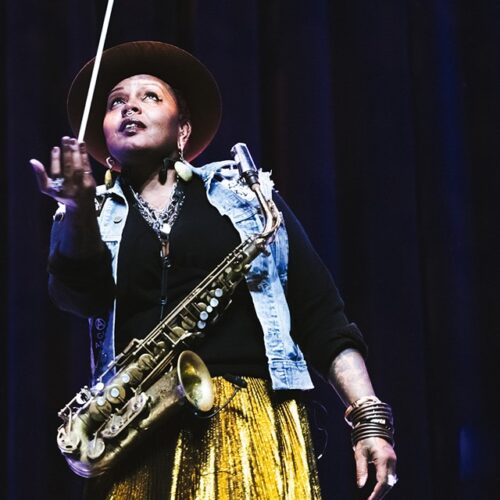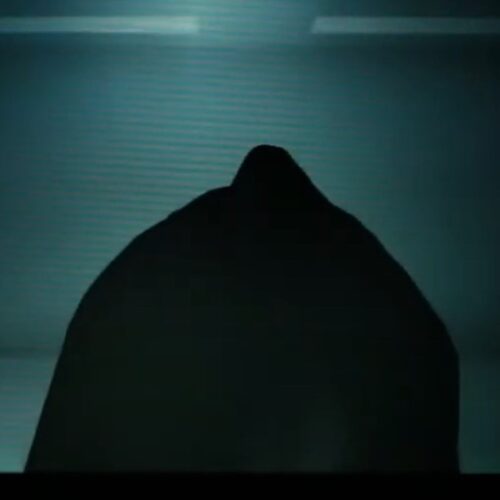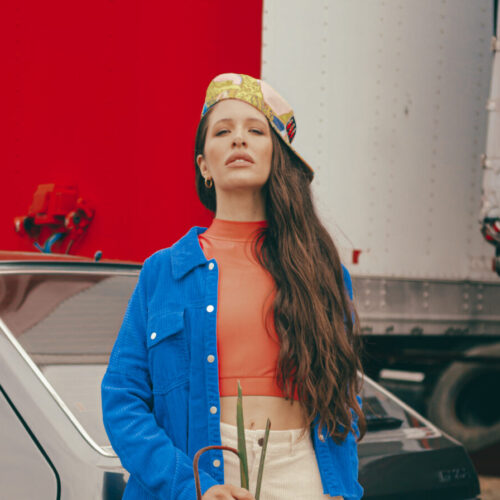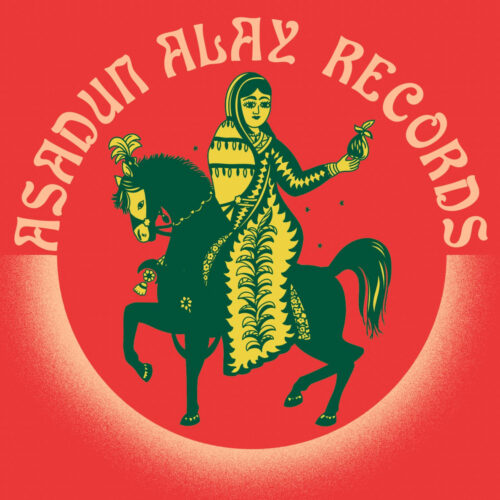Additional Information
Brandon Valdivia is a prominent collaborator and drummer for a number of projects including, US Girls, Sandro Perri, Tanya Tagaq, Sook-Yin-Lee, and more, but with his solo project, Mas Aya, he dissects his own identity as a Canadian-Nicaraguan artist.
He released the Máscaras album back in September 2021, receiving reviews and coverage in big-name media publications like The New York Times for its mesmerizing ambient electronic soundscape style—utilizing flutes, drums, machines, and vocals samples from the Nicaraguan social security protests in 2018. The album also features vocals from his partner, Lido Pimienta, another prominent name in the North American experimental music scene. You can read our review here: https://panm360.com/en/records/mas-aya-mascaras/
Politics has always been at the centre of Valdivia’s solo project, something he believes is his responsibility as a diasporic artist. He comes from a diverse background of music; free jazz, reggae, post-punk, and Toronto’s 2010s experimental music scene, and has made it his artistic mission to talk about the goings-on of the world.
We spoke with Valdivia before his Suoni Per il Popolo show on Sunday, June 19 about his inspirations behind Máscaras, the ongoing evolution of Toronto’s experimental scene, and raising a new household of potential musicians with Lido.
PAN M 360: Your latest album Máscaras is very tranquil and meditative at points, but also seems to come from a place of anger at times. What kind of headspace were you in when you wrote it?
Brandon Valdivia: Do you find that anger comes from specific songs or like the entirety of the record?
PAN M 360: I’d say by the second or third song it’s definitely present.
Brandon Valdivia: Yeah I would definitely say that with the third song “18 de Abril,” there is a wave of anger or I’d call it much more of a forcefulness. There’s always a sort of punk rock energy in my stuff. I don’t even come from punk, but I do come from more intense music. I also have a history with free jazz or very like expressionistic free jazz, like spiritual free jazz, of like the late ’60s, namely, Coltrane and Pharoah Sanders. So I always kind of have that sort of like punk/free jazz energy and when I do some things like seemingly very calm and static-like, I definitely have to have the energy bubbling up. So that’s just kind of part of me, who I am sort of as a musician, so I think that’s always there. But I think generally, the headspace I was in felt contemplative, a very looking inwards mode. Like many of the voice samples that you hear on the record, those came after the music was written.
PAN M 360: You mean the samples of the protests in “18 de Abril” for example?
Brandon Valdivia: Yeah that was a result of what was happening in Nicaragua at the time, which was these intense protests, and basically a full, six months, seven months, to a year of action by the people. I had family members getting put in jail for protesting or being near a protest and being turned into, basically political prisoners. And there was the government that was murdering people. And so there was definitely an element, which later came into the music part, of this anger. This sort of like the ‘rage against machine’-like righteous rage, kind of righteous anger. So yeah, it was a bunch of emotions of looking for peace within myself in addition to this rage bubbling underneath.
PAN M 360: So you’re Canadian, but your parents are from Nicaragua?
Brandon Valdivia: My dad is from Nicaragua, yeah.
PAN M 360: So do you feel like you have to tell these stories as you wrestle with your own identity as an artist? You’re coming from this place, but you weren’t actually born there.
Brandon Valdivia: I think a lot of diasporic sort of people kind of wrestle with that in a lot of different ways, or they don’t at all. I went to Nicaragua in my 20s, for the first time, just after university because my sister went there after high school and I saw how much she changed by being in the land for like six months. She didn’t have any sort of like poetic or philosophical kind of insights into what happened, but I did because that’s just me as an artist. I definitely am Canadian, but I do come from somewhere else too. So since doing this record, and kind of representing Nicaragua in a way, I’ve gotten a lot of messages from people in Nicaragua saying how powerful and important it is. Even performing live, when I’m performing with my partner, Lido [Pimienta] there’s even representation in that way, as far as Central America, because Nicaragua is such a small country. It has a lot of cultural output. But it’s not super representative in Canada, even in the US, it’s not that representative. So yeah, there is definitely this sense of responsibility to represent Nicaragua.
PAN M 360: And with the protests happening there at the time, that probably influenced your responsibility to document it in a way?
Brandon Valdivia: Yes, I definitely felt the responsibility to talk about that. I’ve always been political in my art, in my music-making. I’ve always wanted to talk to or either sing directly about protest movements, or resistance movements or have samples from different protest movements or speeches. Like even the media wasn’t covering it [the Nicaragua 2018 protests] that much. But I’m not Nicaraguan and I try to have it be a diasporic representation of what was happening there but also being Latin American within Canada and North America. So it’s a lot and a long conversation.
PAN M 360: So when you were getting your start as Mas Aya was there a lot of musicians making political music in Toronto? I mean obviously, in hip hop it’s always been there, but what about the experimental scene? Was there much support for political music?
Brandon Valdivia: No. Absolutely not. I started Mas Aya back in 2012. I’m a drummer and I’ve been always involved with lots of projects and bands, so it was always on the back burner. So when I started in 2012, that was actually a large part of my own personal sort of political awakening. And again, I’ve always been political, but these insights that I was having felt were super clear. And I definitely felt anger at basically, what I felt was the experimental music scene in Toronto … it was super navel-gazing. And very sort of like, I’ve used the word nihilistic in the past, and I felt like there was an aspect of that, which is also political, but I definitely felt, to be frank, I felt like no one was talking about anything.
I had many discussions about this with other political musicians about how it felt like everyone was on their own privileged island. And that’s not to discount what they do or be negative, but that’s just how I felt. So I felt like I really wanted to put it in their faces. Like, say ‘Wake up, shit’s happening in the world’ and people would just be playing noise feedback shows to like five people. And I would compare it to other scenes I was playing in. I was in a reggae band, I played with a Zimbabwean Bira [ceremony] player and in these noise scenes, there were all these white art students. Toronto is very diverse and it was back then too, so why was it not diverse in the scenes? So yeah, again lots of questions.
PAN M 360: So your music was a response to those feelings then?
Brandon Valdivia: Very much so. I was playing in these DIY arts spots and my music was very political. I was kind of going from this anarchist direction action kind of standpoint. So yeah, anyway, that’s kind of the vibe. I wanted to kind of slap people in the face with politics.
PAN M 360: I think the diversity within the experimental scene has definitely changed and it’s no longer just white guys with guitar loops, but I’m not sure about it being more political now.
Brandon Valdivia: Yeah I do have a feeling that it is changing, but to be totally honest with you, I haven’t been part of a scene for, I’d say four years now. In that time I’ve become a new dad, there has been a pandemic, Lido’s project has us traveling a lot, and then mine on top of that. And we moved to London, Ontario a year ago. So I can’t really speak to it, but from what I can tell on social media and just listening to new music, there are definitely more women now which is fantastic. And I think there is more diversity. I don’t think that people in the 2010s were purposely trying to be segregationists in their music scene, but that’s just what happened. Now there is a younger generation coming and they’re actively making new music.
PAN M 360: The flutes in Máscaras are probably one of my favourite aspects of the album. Just the way they sort of build and take you on this journey.
Brandon Valdivia: Yeah I love the flutes and they are one of the first instruments you hear. My first instrument was the recorder, but I kind of went away from it until I got into Don Cherry. He was using all these bamboo flutes and I was like ‘Woah,’ so I found some quenas which are like from the Indian region and South America and I slowly brought those back into my repertoire. So now I have a good selection of flutes that I play and with my newest record that will be released whenever I’m bringing back the alto recorder. It’s the same and similar vibe as this one [Máscaras] but more organic worlds with flutes, drums, and synths, but the same kind of explorations.
PAN M 360: And for the upcoming Suoni live show, are you playing the flutes and drums?
Brandon Valdivia: What I’m doing now is more of a basic mix on Ableton Live where I’m basically pressing play, and having like some effects, some live mixing, but the focus is on my performing of live drums, performing with the live flute, and I have a synth and have a drum machine as well. I mean, what’s more, interesting and what’s more me? The need to be on a computer, like mixing stuff on a MIDI controller, or be fucking playing drums live on top of my music? I’m more of a drummer. So again, it’s just trying to meld the different experiences that I’ve had. I’m 40 years old so I’ve been doing this for a long time but it’s like finally, in these last few years, I feel like my identity is here.
I’m a slow person in general. I’m a slow learner, I would say in a way, but once I really learn or like something, I lean heavily into it. And I just kind of feel like that’s kind of what’s happening. It’s just I feel like all these past years of playing drums playing in different bands and all these experiences and playing different music, playing percussion, playing theatre, doing soundtracks or doing live doing scores for theatre pieces, all this stuff has kind of built up into what I’m doing now.
PAN M 360: What’s it like being partners with Lido? She’s another musician with her own successful project and you play in each other’s projects, but just having another creative person to bounce ideas off of?
Brandon Valdivia: I mean it’s fantastic. We’re very different but also two very similar artists. I had her playing on my first tape back in like 2012, she would just come and improvise vocals with me, before we were even friends. If you talk about the Toronto scene back then, Lido was like a breath of fresh air to me. Here was a person from Colombia that was interested in experimental music and unapologetically doing her own thing. So now, we’ve been playing together for many years and it just comes naturally. We are both very questioning of things happening in the world, and we came from this punk rock, anti-establishment style. We both like music on the fringes and that’s marginalized and not so mainstream. And just seeing her career take off has been very inspiring because I get to be a part of it as her drummer, which is awesome. She brings a lot out of me and I’ve learned so much from her. But it’s always busy busy busy and we have kids together so this kind of our life.
PAN M 360: Are the kids getting interested in music at all as well?
Brandon Valdivia: Well Lido’s son, my step-son, he’s 14 and he’s really into music. He’s a piano player and just has really great taste, as far as listening to a bunch of different stuff. We have an old version of Abelton on one computer and so he works on beats and we’re definitely pushing that and he loves it. He’ll sit and play piano for hours. Then there’s Lido’s nephew and who loves listening to music but hasn’t gotten into playing yet. And then there’s the baby, Martina, she’s four, and she seems to have a natural sense for music. She comes in and plays and I put effects on her voice and then I’ll play piano and play drums and we just kind of jam and she’s just kind of dancing with the microphone and has attitude. She’s like a little Lido.
PAN M 360: It definitely seems like you’re both sowing the seeds for future musicians who eventually release their own stuff. So you have a jam space in your house in London?
Brandon Valdivia: Yeah there’s a music studio in the basement and Lido has an arts studio in downtown London. But yeah we’re never pushing for the music. It’s only if they want to do it and it seems like they’re all interested in pursuing music. Especially Lucien, the 14-year-old. He seems pretty obsessed with music and reminds us of what we were doing when were teenagers, making and discovering music.
